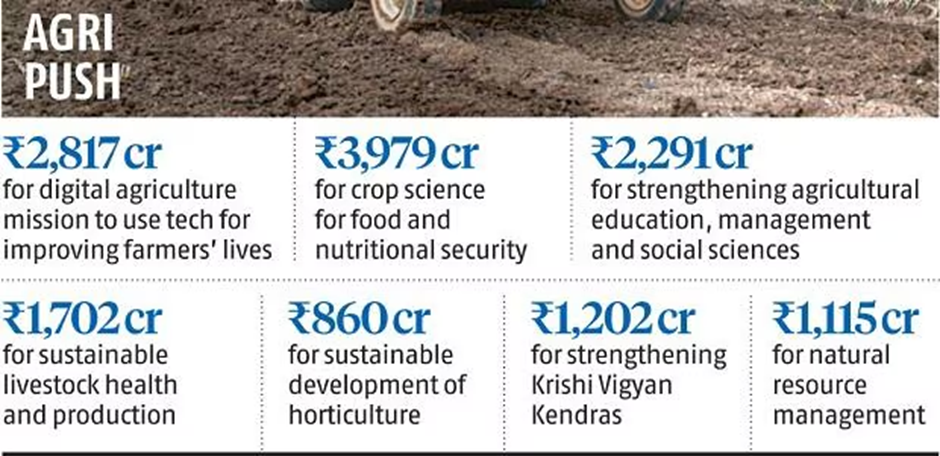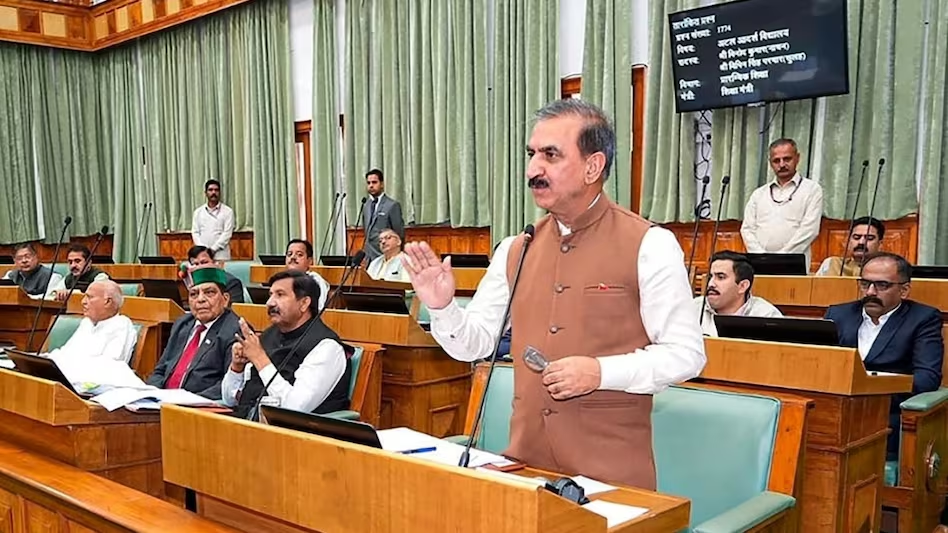- Courses
- GS Full Course 1 Year
- GS Full Course 2 Year
- GS Full Course 3 Year
- GS Full Course Till Selection
- Answer Alpha: Mains 2025 Mentorship
- MEP (Mains Enrichment Programme) Data, Facts
- Essay Target – 150+ Marks
- Online Program
- GS Recorded Course
- Polity
- Geography
- Economy
- Ancient, Medieval and Art & Culture AMAC
- Modern India, Post Independence & World History
- Environment
- Governance
- Science & Technology
- International Relations and Internal Security
- Disaster Management
- Ethics
- NCERT Current Affairs
- Indian Society and Social Issue
- NCERT- Science and Technology
- NCERT - Geography
- NCERT - Ancient History
- NCERT- World History
- NCERT Modern History
- CSAT
- 5 LAYERED ARJUNA Mentorship
- Public Administration Optional
- ABOUT US
- OUR TOPPERS
- TEST SERIES
- FREE STUDY MATERIAL
- VIDEOS
- CONTACT US
7 major schemes for improving farmers’ lives
7 major schemes for improving farmers’ lives

The Union Cabinet recently approved seven new schemes with a total outlay of nearly Rs 14,000 crore aimed at enhancing the agriculture and allied sectors. These schemes focus on advancing research and education, boosting climate resilience, optimizing natural resource management, promoting digitalization, and developing livestock and horticulture to equip farmers with capabilities for adopting climate-resilient agricultural practices.
Key Schemes Announced
-
Digital Agriculture Mission (DAM)
- Agri Stack: A comprehensive platform providing end-to-end services across the agricultural food value chain. Each farmer will receive a unique digital ID linked to their Aadhaar, including personal, land, production, and financial details.
- Krishi Decision Support System: A system to standardize and integrate various data types such as remote sensing, weather, soil data, and government schemes to support better decision-making.
-
Crop Science for Food and Nutritional Security
- Objectives: Focused on advancing research and education, managing plant genetic resources, enhancing food and fodder crops, improving pulse and oilseed crops, and advancing commercial crop varieties. This includes research on entomology, microbiology, and pollination.
-
Strengthening Agricultural Education, Management, and Social Sciences
- Focus: Modernizing agricultural education and research in line with the New Education Policy 2020. Emphasis on integrating cutting-edge technologies like AI, big data, and remote sensing, and promoting natural farming and climate resilience.
-
Sustainable Livestock Health and Production
- Objectives: Enhancing livestock and dairy sector sustainability to increase farmers' income. Key areas include animal health management, veterinary education, dairy production technology, genetic resource management, nutrition, and small ruminant development.
-
Sustainable Development of Horticulture
- Focus: Improving income through the cultivation of a diverse range of horticultural crops including tropical, subtropical, temperate varieties, root, tuber, bulbous crops, vegetables, floriculture, mushrooms, plantation crops, spices, and medicinal plants.
-
Krishi Vigyan Kendras (KVKs)
- Purpose: Strengthening agricultural extension services and sustainable resource management. KVKs will evaluate and demonstrate location-specific technology modules for agriculture and allied enterprises.
-
Natural Resource Management (NRM)
- Objective: Promoting sustainable use of natural resources to meet current needs while ensuring future generations can also meet their needs.
Role of Technology in Indian Agriculture
-
Crop Preparation Stage
- Soil Health Monitoring: Advanced sensors and remote sensing technologies enable precise monitoring of soil health, enhancing fertilizer application and soil fertility.
- Agricultural Machinery: Modern machinery increases efficiency and reduces labor costs, boosting agricultural output.
- Biotechnology: Genetically modified crops improve resistance to pests, diseases, and drought, leading to higher productivity and quality.
-
Cultivation Stage
- Drones: Used for aerial seeding, precision pesticide spraying, and data collection, enhancing farm management.
- Agri-Tech Startups: Introduce innovative technologies and practices, improving efficiency and access to finance.
- Climate Adaptation Technologies: Include climate-resilient crop varieties and weather prediction tools to adapt to changing climates.
- Renewable Energy Integration: Solar-powered irrigation and biogas production reduce fossil fuel dependence and lower energy costs.
-
Harvesting Stage and Food Processing
- Supply Chain Optimization: Technologies like blockchain and IoT enhance supply chain transparency and efficiency, improving traceability and reducing costs.
- Precision Livestock Farming: Wearable sensors and monitoring systems provide real-time data on livestock health and productivity.
- Food Processing and Preservation: Advances ensure food safety, extended shelf life, and reduced waste.
- Market Access: E-commerce and internet platforms enable direct market access for farmers, increasing profitability.
- Digital Platforms for Knowledge Sharing: Facilitate access to expert advice, educational resources, and peer support.
Key Initiatives Related to Agriculture
- Pradhan Mantri Fasal Bima Yojana (PMFBY)
- Soil Health Card Scheme
- Pradhan Mantri Krishi Sinchai Yojana (PMKSY)
- e-National Agriculture Market (e-NAM)
- Paramparagat Krishi Vikas Yojana (PKVY)
- Digital Agriculture Mission
- Unified Farmer Service Platform (UFSP)
- National e-Governance Plan in Agriculture (NeGP-A)
- Mission Organic Value Chain Development for North Eastern Region (MOVCDNER)
Conclusion
The new schemes announced by the Union Cabinet represent a significant investment in India's agricultural sector, aimed at boosting farmer incomes through advanced technology, sustainable practices, and improved research and education. While these initiatives hold promise for transforming agriculture, their successful implementation will depend on addressing challenges, integrating new technologies with traditional practices, and ensuring environmental and social considerations are met.
Must Check: Best IAS Coaching In Delhi
UPSC Prelims Result 2024 Out: Expected Cut Off & Other Details, UPSC Prelims 2024 Answer with Explanation, Daily Prelims Quiz, Daily Current Affairs, MONTHLY CURRENT AFFAIRS TOTAL (CAT) MAGAZINE, Best IAS Coaching Institute in Karol Bagh, Best IAS Coaching Institute in Delhi, Daily Mains Question Answer Practice, ENSURE IAS UPSC Toppers, UPSC Toppers Marksheet, Previous Year Interview Questions, UPSC Syllabus




